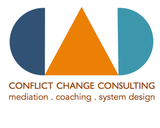Here is the most important point to remember – mediation is an opportunity. Mediation is voluntary, consensual, confidential and party-centric.
Mediation is a process that is used to solve disputes. It is often described as a facilitated negotiation. The disputing parties negotiate to seek a solution, but they are assisted by a neutral and independent third-party, the mediator. The simplest mediation would literally involve three people sitting down to talk – each side and a mediator. In mediation as in life things often get more complicated. For example, parties may want to have lawyers with them, or experts in the issues, or supporting parties (e.g. friends or family). The issues at stake may relate to any type of dispute. Mediation is routinely used to solve small claims, commercial disputes or family issues. However, it has also been used to solve durable and violent conflicts.
Sometimes people describe mediation by explaining what it is not. It is not arbitration or litigation, where a third party will make a decision for the parties as to the correct solution. In mediation, the solution must come from the parties themselves.
There are less formalised rules in mediation than with arbitration or litigation, for example there are no rules of evidence or procedure, which must be followed. The parties with the guidance of the mediator are free to determine how best to conduct their mediation. If the parties decide it should be held outside, or over the phone, or through shuttle diplomacy, they can make these decisions.
Mediations may result in an agreement between the parties, which is usually documented as a settlement agreement that is a legally enforceable contract. Alternatively, there may not be an agreement at the end of the mediation, in which case the parties must decide how to proceed.
In either case, whether there is a settlement or not, it is most probable that the parties will have gained a new understanding of the dispute, their own interests and the perspective of the other side.

